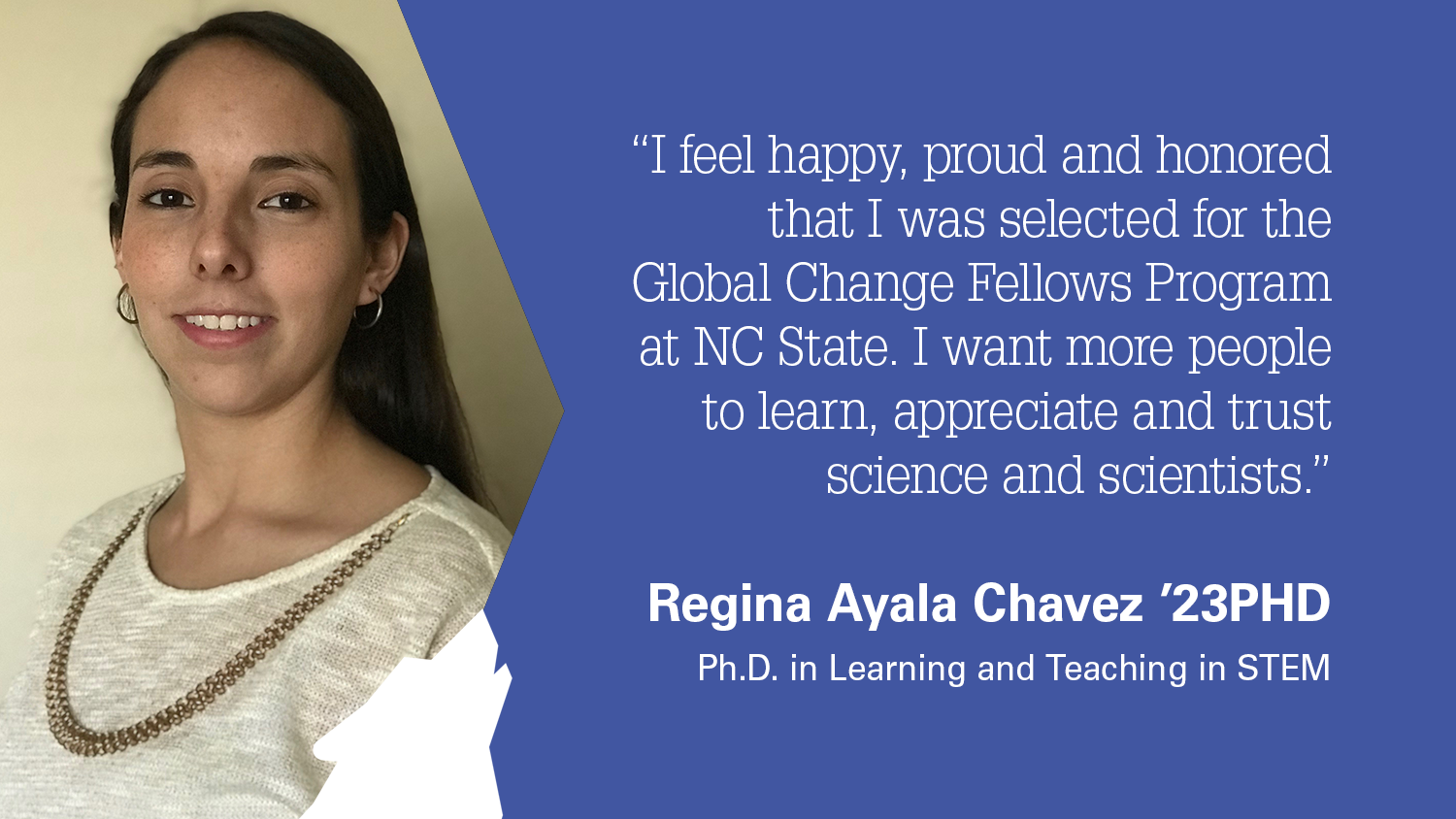Learning and Teaching in STEM Doctoral Student Regina Ayala Chavez ’23PHD Selected as 2021-22 Southeast Climate Adaptation Science Center Global Change Fellow

Growing up in Pachuca, Mexico, Regina Ayala Chavez ’23PHD was introduced at an early age by her family to pro-environmental behaviors, such as recycling and waste reduction. That early introduction inspired her to dive deeper into climate change when she enrolled in college.
Chavez attended the National Autonomous University of Mexico (UNAM), where she studied physics as an undergraduate and engineering in energy as a graduate student. While developing her thesis, she met Héctor Moreira Rodríguez, Ph.D., a professor of energy policy at UNAM and an energy advisor for the Mexican government, who taught her about climate change, energy savings programs and clean energy.
“This was the first time I was motivated to take action to solve environmental problems,” Chavez said.
Upon graduation, Chavez landed a job teaching science on a TV program in Mexico, where she designed and carried out science experiments for children and adults. When her husband was transferred to North Carolina for work, she volunteered in the lab exhibit at the North Carolina Museum of Life and Science and worked at Marbles Kids Museum, improving a STEAM exhibition.
Through those experiences, Chavez discovered she had a passion for teaching science and wanted to pursue a career in science education, especially in out-of-school learning settings.
Chavez is enrolled in the NC State College of Education, where she is pursuing a Ph.D. in Learning and Teaching in STEM in the science education program area of study, and serves as a research assistant for K.C. Busch, Ph.D, an assistant professor of STEM education.
“I was interested in a Ph.D. in science education because I’ve experienced people’s happiness and excitement when they see science and understand it. NC State was the only institution with an informal focus on education and the only one with a professor [K.C. Busch] who studies climate change in informal settings,” she said. “It was the perfect match for me.”
Because of her research interest and passion for climate change, Chavez was selected as a 2021-22 Southeast Climate Adaptation Science Center Global Change Fellow.
The Global Change Graduate Fellows Program is designed to train the next generation of global change scientists by providing financial, scientific and professional development support for NC State graduate students who are interested in multidisciplinary global change research.
“I am so excited to work in research related only to climate change for a whole year. I feel happy, proud and honored that I was selected for this program,” Chavez said. “I am excited to become a member of this program and to meet new people with the same interest as mine, but with different focuses. I think that climate change needs to be attacked on many fronts.”
Fellows come together across disciplines to discover, collaborate and share their knowledge with diverse stakeholders. The fellowship program is sponsored by the USGS Southeast Climate Adaptation Science Center and NC State University.
By participating in the year-long fellowship, Chavez hopes to learn more about justice and politics in climate change. Focused on the science behind climate change, she also hopes to learn more about other areas that conform to the problem and the solution.
“I believe this fellowship could be beneficial for my professional development because I will work with more people interested in climate change and build a community of learning to collaborate and learn from each other,” she said.
Chavez’s research focuses on how household managers make decisions for their homes to mitigate climate change. More specifically, she wants to target Spanish-speaking women because she can relate to them as a person with a similar lifestyle and whose first language is Spanish.
“When I moved to the United States, I became in charge of the household. Since I made the shopping, cooking and purchasing decisions, I realized the power I had to change my life to become more eco-friendly,” Chavez said. “My experience made me think about how my position as a household manager can empower and convince more people, especially women and mothers, to change and adapt to climate change.”
Through her research, she plans to gather scientific information to help Spanish-speaking household managers understand how changing small things in their homes can contribute to the adaptation and mitigation of climate change. Chavez also plans to build tools, such as practical guides, to help underrepresented groups transition between their current lifestyle to a more eco-friendly lifestyle.
Upon graduation, Chavez plans to either work with a climate change association that helps train people, organizations and businesses to act against climate change behavior, or work at a museum designing and evaluating exhibitions that help engage audiences in STEM topics.
“I want more people to learn, appreciate and trust science and scientists,” she said.
- Categories:


